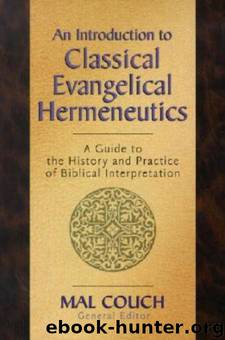An Introduction to Evangelical Hermeneutics: A Guide to the History and Practice of Biblical Interpretation by Mal Couch

Author:Mal Couch
Language: eng
Format: mobi
Tags: Christian
ISBN: 9780825423673
Publisher: Kregel Publications
Published: 2000-08-27T20:00:00+00:00
Ezekiel and Joel continue, by progressive revelation and the inspiration of the Holy Spirit, to give more details about the new covenant. The Lord will slosh (zarach) clean water on the Jews whereby "I will cleanse you from all your filthiness and from all your idols" (Ezek. 36:25). Since water would not cleanse away idol worship, the cleansing referred to would be a spiritual one. As well, the Lord promises a new, soft heart that would be obviously responsive to Him (v. 26). And most importantly, He will place His Spirit within (v. 27; 37:14). Mixed together and swirling around the new covenant is the Palestinian covenant that promises God would someday "gather you from all the lands, and bring you into your own land" (36:24). As dead bodies, Israel will be spiritually resurrected and returned to their own land (37:12). "Behold, I will open your graves and cause you to come up out of your graves, My people and I will bring you into the land of Israel."
The tangible promises of a return and restoration to the land are a unique blessing for the Jews by which their kingdom promises are restored. The intangible promises of permanent forgiveness of sins and the indwelling of the Holy Spirit would be granted to both Jew and Gentile. Again, forgiveness and indwelling originate from the blessing portion of the Abrahamic covenant. This blessing would fall upon both the physical children of Abraham and "all families of the earth" (Gen. 12:3).
Concerning the new covenant and its promise of the coming Spirit, the prophet Joel continues, "I will pour out My Spirit on all mankind" (Joel 2:28). In the same paragraph Joel predicts the display of wonders in the sky: "blood, fire, and columns of smoke ... before the great and awesome day of the LORD comes" (vv. 31-32). In Acts 2, Peter refers to this entire paragraph when he speaks of the outpouring of the Holy Spirit. He certainly did not understand the issue of the separation of time between the coming of the Spirit and the beginning of the "day of the LORD," the tribulation (Acts 2:14-21). Many dispensationalists and nondispensationalists believe that when Peter said, "This is what [the coming of the Holy Spirit] was spoken of through the prophet Joel" (v. 16), he was simply saying "this is `like' what was spoken by Joel."
But after the coming of the Spirit at Pentecost, throughout the book of Acts, the Spirit continues to fall upon Jew and Gentile alike. When Peter visited Cornelius's house and the Gentiles there, "all the circumcised believers who had come with Peter were amazed, because the gift of the Holy Spirit had been poured out upon the Gentiles also" (Acts 10:45). In looking at Joel 2:28 and how Peter quotes it, it is clear the Spirit is meant for both Jew and Gentile. In 2:28 it is written that God's Spirit would come upon "all mankind." The Hebrew text reads "upon all basar." Basar is a metaphor for the human race.
Download
This site does not store any files on its server. We only index and link to content provided by other sites. Please contact the content providers to delete copyright contents if any and email us, we'll remove relevant links or contents immediately.
| Exegesis & Hermeneutics | New Testament |
| Old Testament |
The Five People You Meet in Heaven by Mitch Albom(3561)
The Secret Power of Speaking God's Word by Joyce Meyer(3180)
Real Sex by Lauren F. Winner(3014)
Name Book, The: Over 10,000 Names--Their Meanings, Origins, and Spiritual Significance by Astoria Dorothy(2979)
The Holy Spirit by Billy Graham(2944)
0041152001443424520 .pdf by Unknown(2843)
How The Mind Works by Steven Pinker(2813)
ESV Study Bible by Crossway(2774)
Ancient Worlds by Michael Scott(2682)
Churchill by Paul Johnson(2578)
The Meaning of the Library by unknow(2565)
The ESV Study Bible by Crossway Bibles(2550)
The Gnostic Gospels by Pagels Elaine(2527)
MOSES THE EGYPTIAN by Jan Assmann(2412)
Jesus by Paul Johnson(2352)
City of Stairs by Robert Jackson Bennett(2347)
The Complete Dead Sea Scrolls in English (7th Edition) (Penguin Classics) by Geza Vermes(2277)
The Nativity by Geza Vermes(2226)
Ancient Near Eastern Thought and the Old Testament by John H. Walton(2223)
